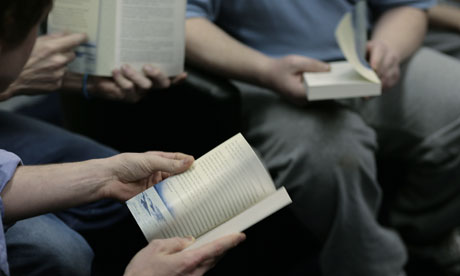
In times like these, you have to believe in the possibility of change or you would go mad. That individuals are being blamed by the state for everything bad that happens to them needn't negate the fact that people have the power to transform their lives, so it's as good a time as any for doctors to start prescribing books, rather than drugs, to people suffering from depression and anxiety.
Patients will be recommended specially written books with to-the-point titles such as How to Stop Worrying. It's a tested, and popular, formula: in Wales, where the Books on Prescription service has run since 2005, three of the 10 most borrowed library books are self-help titles. I can't help wondering, though, what the effect would be if novels were prescribed instead.
Change that begins with the individual doesn't end there, a thought that reminds me of the story of Jane Davis, founder of the remarkable Liverpool-based charity The Reader Organisation, which seeks to bring about a "reading revolution" by encouraging people to read poetry and novels aloud to each other.
Davis had, in her own words, "something like a nervous breakdown" on reading Doris Lessing's 1979 novel Shikasta. She was a single parent of two small children, out of work, with few qualifications, and was desperate for something better without knowing how to get to it. She wrote to Lessing demanding her help; the author replied that she needed to keep reading. Davis simply needed the affirmation that a different life was possible, one that was achievable through the mastery of language.
The Swiss linguist and thinker Ferdinand de Saussure describes language as a form of treasure that is shared with others when we speak. Treasure is also something that can be hoarded. If you keep all the good words – the rich, descriptive, wild long words – to yourself then you retain their high value. Share them with the masses and you end up, suggests both Saussure and the sociologist Pierre Bourdieu, with the linguistic means to create a society of equals, which is exactly what the hoarders of social and cultural capital don't want.
Putting the canon aside, for the last few years I've had a self-help bible of sorts: a book that seeks to explain why, in the face of the dedicated assault on the values, people and places we love by forces indifferent to that fact, our immediate reaction is not always to put up a fight, but to curl into a ball and retreat. Written in the late 80s by the American rabbi and activist Michael Lerner, it has the ungainly title Surplus Powerlessness.
Lerner developed from his work as a community organiser in working-class Oakland, California, a compelling theory – the "surplus powerlessness" of the title – to explain why the people he worked with tended not to challenge unfair working practices, low status and inadequate pay, whether unofficially or as members of a union. Most disturbingly, a sense of powerlessness atomised them rather than brought them together.
"Powerlessness corrupts," he wrote, because it crushes out of all proportion our sense of what is worthwhile and possible in our own lives and the lives of those around us. The carnage wreaked in the 1980s by the first wave of neoliberalism knocked the stuffing out of entire towns and cities. Of course, that's not to say that people didn't fight back against Thatcher; more that the effect of her policies – indeed, the intention of her policies – was to stun into submission those who had built their lives using values diametrically opposed to hers.
Christopher Williams of Glasgow University, who produced a report which this month suggested that self-help books might be as useful in treating depression as medication, agrees that "depression saps people's motivation and makes it hard to believe change is possible".
Yet self-help books tend to talk solely of personal psychology and motivations, neglecting the social and economic context that Lerner's book so acutely describes.
Davis and her husband, Phil, director of the Centre for Research into Reading, Information and Linguistic Systems at Liverpool University, argue that reading literature – poetry, plays and novels – with others opens up a discussion about broader social themes, reminding individuals that their lives and their circumstances can't be considered in isolation from each other.
An evaluation of one of The Reader Organisation's shared reading projects, held within Mersey Care, an NHS trust specialising in treatment for mental ill-health and substance misuse, recorded the benefits of reading in company as described by one woman: "Doctors and stuff aren't always what you need. Other people can help too."
The accumulated experience of peers and equals, all of whom have been in the same boat at one point or other, is shared to the benefit of everyone. It's hard to think of a more powerful, not to mention empowering, sentiment.

